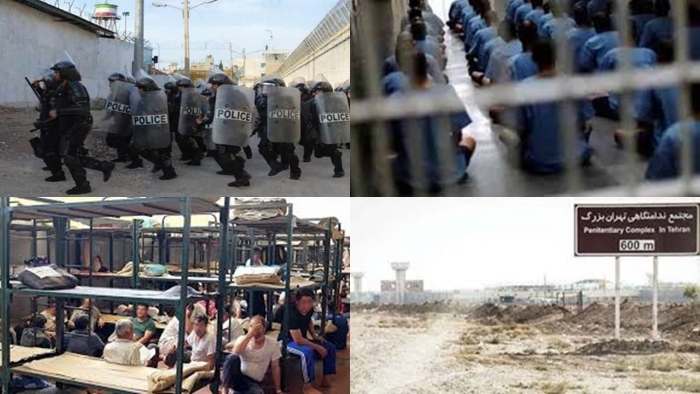Reconstructing Auschwitz in the Greater Tehran Prison is not a mere phrase, it is a bitter reality.
The Auschwitz camp was the most extensive Nazi concentration camp built by the Nazis during Poland’s occupation. Millions of people were killed by SS forces during World War II from 1939 to 1945 in Auschwitz. Nazi Germany killed them under the command of Colonel Rudolf Hoss and his troops in this camp.
Making prisoners starve
To exhaust the victims to death, Auschwitz authorities used starvation and forced labor. This is the same procedure used by the prison authorities in Greater Tehran. Prison officials torture and put double pressure on prisoners in the Greater Tehran Prison by starving them.
According to the news received from this prison on Tuesday, October 13, prisoners in the Greater Tehran Prison brigades suffer from food shortages.
Low and smelly food!
In GTP the prison authorities have removed eggs removed from prisoners’ diets for some time. When food is distributed, each prisoner receives only about 10-12 tablespoons of rice, which has an inferior quality and stinks. Every prisoner must make up for the lack of food at his own expense to be satisfied. But what percentage of prisoners can afford it?
A report from the prison emphasizes that these pressures are carried out under the Ministry of Intelligence (MOIS) ‘s full supervision and the Chief Judiciary.
But this is not all problem: On the other hand, because the water in this prison is supplied from polluted wells, the prisoners do not have drinking water and have to buy each bottle of water for 3,000 tomans.
Widespread corruption of officials in Greater Tehran prison
This is while the prisoners have no source of income. Most of these prisoners were heads of households before their arrest. In addition to their families being left homeless and hungry, they need their families’ help to earn a living. This situation has put additional pressure on the prisoners as well as their families.
Another report from the Greater Tehran Prison states: “In this prison, prisoners are awakened every morning at 6:30. “They are forcibly sent to the airport at 7 to 8 in the morning for statistics.”
Rape and looting in this Auschwitz death camp have become legitimate
Earlier, political prisoner Soheil Arabi sent in several documented reports on the deteriorating health situation, horrific class divisions, distribution of drugs by prison guards, disregard for patients’ condition, and disregard for the health status of prisoners in different brigades of Greater Tehran Prison.
Following the publication on of these information, the regime’s authorities transferred Soheil Arabi and since then his situation is in limbo.
There are 20-bed suites in Greater Tehran where sometimes 60 to 70 people are held as punishment instead of solitary confinement. There is a bathroom and a toilet separated by a curtain from the hall in the corner of each suite. With this structure, the annoying stench always looks natural in the whole hall.
The doors are always closed in the punishment suites. Prisoners have no access to ventilation, sunlight, cigarettes, or shops. The prisoners kept there until they surrender to the terrible conditions of the prison. They returned to the public ward with a commitment. In general, the Greater Tehran Prison’s available space is designed to make all prisoners to succumb to their torturers’ demand.
The prison authorities have set up a wildlife camp where drugs are easily found. Rape has become natural. Extortionist gangs and thieves openly extort and rape newcomers. All this is done in coordination with the head of the ward and the guards and prison officials.
Rough inspections
Monthly inspections are harsh and inhumane. Prison officials allow soldiers to use violence against prisoners. They even break their dishes and flasks to find drugs. All the while the prison authorities control distribution of drugs. Prison guards destroy all the prisoners’ belongings. The slightest protest of the prisoner answered with a baton and a beating. They told prisoners that they do not have the right to recognize soldiers’ faces during inspections. If they raise their heads, they will face the strongest reaction of the special guard.
